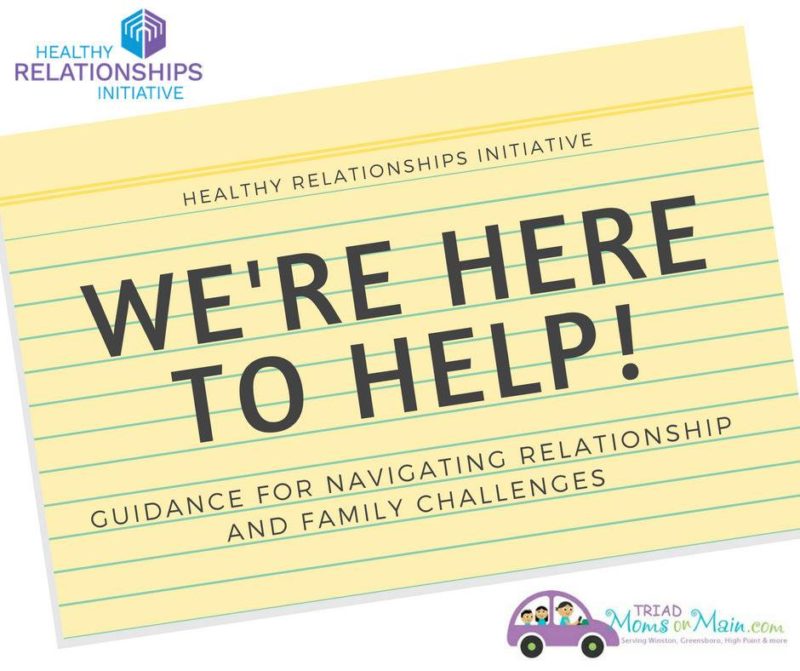How to Get Your Teen to Talk to You
By Guest Blogger Christine Murray, PhD, LPC, LMFT, Director of the Healthy Relationships Initiative
Relationships are a wonderful part of life, but they also can be challenging! That’s why our Healthy Relationships Initiative (HRI) team is excited to partner with Triad Moms on Main to start this new series of blogs. In this series, we’ll offer general guidance to relationship or family questions submitted by TMoM community members. We know that if one person in our community is facing a challenge, it’s likely others can relate as well, so we thank those who submitted questions so far and look forward to responding to more in the future!
We’re kicking off this series with our response to this question from a local TMoM reader:
I’d love to know how to get my 13-year-old son to open up to me more. He hit the teen years with a bang but seems to have shut off his communication completely. Help!
As children enter the teen years, it can be scary for parents when they start to worry that their children are slowly slipping away. Keeping an open line of communication is just as important now as when your son was younger, although you can expect that communication will look different now. Here are a few suggestions for embracing this new stage of your teen’s life and fostering new ways of staying connected:
First, if your teen isn’t inclined to talk a lot, focus on connecting through activities. TMoM offers a great list of ideas of activities geared toward tweens and teens here. What’s most important, though, is connecting with your child around his or her interests. This might force you out of your comfort zone if your own interests aren’t in line with your child’s, but spending time together doing activities they enjoy will show your teen that you want to support them in their interests. Use the opportunity to ask them to teach you what they know. Listen carefully, ask open-ended questions to follow up, and take advantage of the opportunity to learn more about your son. Even if there’s not a lot of talking while you enjoy activities together, trust that spending time together builds memories and a stronger bond that can open doors to more in-depth conversations later.
Second, when you have specific concerns or issues to discuss with your teen, set the stage for these conversations to to be as non-threatening as possible. Don’t let these conversations be a surprise. Instead, let your teen know you’d like to talk with them about the issue at hand, and ask when a good time would be to have this conversation. You also could ask where they’d be most comfortable talking. Some teens feel comfortable talking at home, but others prefer being outdoors or at a coffee shop or restaurant. If the topic is potentially embarrassing, start out by acknowledging that the conversation may be awkward, but that you’re there to talk things through and want to make it as comfortable as possible.
Third, reflect on your own teen years and how you felt talking with your parents. If you’re like me, there were a lot of topics that you were embarrassed to talk about with them, and it was hard to imagine that your parents could relate to the things you were going through! Put yourself into the mindset of your teen by revisiting your own experiences. Think about what your parents could have done to encourage you to open up more to them. You may even find it helpful to share stories about your teen years with your son so he can see that you were once in his shoes.
Finally, as best you can, live the kind of life yourself that would make your teen just as curious about you as you are about him. Teens naturally gravitate toward adults who they view as living life to the fullest. Unfortunately, their own parents often seem like the most boring people they know, but it doesn’t have to be this way! A lot of parents don’t let their kids in on what’s going on in their lives, such as work challenges, relationship conflicts, and personal goals they’d like to accomplish. Try opening up more about what’s going on in your life to show an example of being open and communicating as a family. And, while it’s normal for parents to set some of their interests and goals to the side when their kids are younger, the teen years are a great time to re-invest in yourself by pursuing new hobbies, professional goals, and friendships. Let your teen see you making the most of your own life, and they’ll see you for the whole person you are and someone who they can relate to as they navigate the teen years ahead.
 Watch for our next blog during the week of April 2nd to answer another question from a TMoM reader.
Watch for our next blog during the week of April 2nd to answer another question from a TMoM reader.








So glad these tips were helpful to you both! We’ve got more resources for parenting teens in our HRI Toolkit here: http://www.guilfordhri.org/community-resources/toolkits/toolkit-for-parenting-teens/. Hope you find these tips help you connect with your teen better!
This is my life. Honestly. Never thought it would happen with my chatterbox daughter but here I sit. Going to use these tips this week!
Thank you, Dr. Murray – this is what we are going through with one of our 15-year-olds and your advice is just what we need!